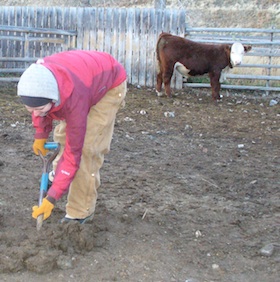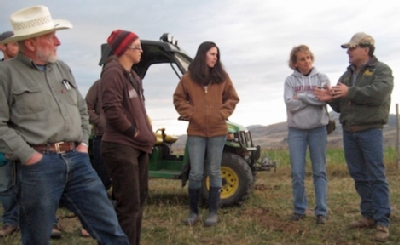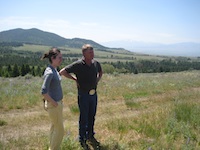Sarah Carvill is a Doctoral Candidate in Environmental Studies at UCSC.
After completing her Bachelor of Arts in Environmental Studies with Highest Honors, she continued on in her quest to understand the dynamic and multifaceted relationship between people and the environment. She went to Montana for her Masters Degree, and returned to Santa Cruz to find answers to questions she’s had since first understanding what “environmentalism” meant.
Here she discusses her research, her journey back to UCSC, and offers advice on choosing a graduate program.
What is your dissertation research focused on?
I study "rural restructuring" in the Western U.S. I'm interested in the way the rural west is changing due to the decline of primary industries such as ranching, mining, and timber production, and as new people and economic activities move into communities that were once more narrowly dependent on resource extraction. I look at the development of water quality control policy for the timber industry, in order to shed light on the role of regulation in what Professor Timothy Duane calls ecotransformation processes. Water quality has become a significant friction point between the timber industry and environmental observers, and the regional structure of water quality policy-making in California provides a unique opportunity for comparative analysis.
I want to tell the story of why the rural West is changing— socially, economically, and ecologically— based on rigorous empirical research, but in language that people who don’t have Ph.D.s can understand and even enjoy.
How did you become interested in environmental science?
When I was growing up, I spent a lot of time skiing in the Sierra, hiking on the North Coast, fishing near Mount Lassen and Mono Lake, and visiting western National Parks in Washington and the Rocky Mountains. When I got old enough to self-identify as an environmentalist, I also started wondering if the people in the towns I visited really did like their spotted owl fried (as some bumper stickers in Washington state claimed). I was never really interested in being a biologist or an ecologist, but I was very aware of and concerned about environmental issues - climate change, deforestation, species extinctions. At the end of high school I took a field course in California energy, and I read Cadillac Desert, and the class and [author Marc] Reisner's approach to his subject were a revelation to me: Using politics, history, and economics to understand the origins of western environmental problems seemed to be the thing I had always wanted to do.
How did your undergraduate education and Master’s program bring you back to UCSC?
In my first year at UCSC, probably about half the classes I took had the word "California" in their titles, and for most of the rest I found a way to focus my final paper or project on the region's environment or politics. I was also looking for a way to go into some small town near big mountains and ask people what they thought about the local environment and the local economy. I ended up going out to the Eastern Sierra to investigate a modest stream re-watering proposal that had exploded into what one reporter later described as “screaming matches over restoration.” I found that long-time locals were deeply protective of water allocations that maintained the appearance of a vibrant agricultural economy, even though extra-basin water transfers had cut off most of the region’s ranches decades earlier.
I followed this question to my master’s program at the University of Montana, just down the Clark Fork River from an incipient multi-million dollar restoration effort, focused on private ranchlands contaminated by mining wastes. I was really interested in understanding how a ranching community with a sawmill, just downstream from a former mining center, was carrying on, socially and economically, and embracing environmental protection, when the resource-based industries by which the Valley had long defined itself were suffering.
 Sarah Carvill working at a cattle ranch. |
I had a great time doing my research. I spent a summer in small-town Montana, asking people all the things I had wondered about from behind my dad's car window when I was a kid, but writing the thesis was total agony. My theoretical question wasn't what I actually wanted to write about.
The hours I spent pounding my head against the disconnect between the two were what finally helped me realize that this restructuring process— not restoration conflict or collaborative conservation per se— was also a legitimate area of inquiry; I just lacked the theoretical tools I needed to imagine research that would holistically explore it. That's when going to grad school went from "something I want to do, probably," to "something I have to do to, because it's how I'm going to answer the questions that I need to answer."
When you have a chance to step away from your work and research, what do you do?
I spend nearly all my free time either writing or running. Writing and environmental issues have always been pretty closely joined for me. Part of the reason I majored in Environmental Studies was that I wanted to take ENVS 156— Environmental Action Through Writing, with Sarah Rabkin. She was a wonderful resource and mentor to me in college. She hired me as a tutor for ENVS 100 and then ENVS 156, and encouraged me to apply to Field Quarter because she predicted (rightly) that training in natural history would be an asset to me as an essayist; she was also the person who told me to look at the University of Montana's Environmental Studies master's program, because it offers an environmental writing emphasis.
Writing is obviously a huge part of my daily life in grad school, too, and one of the things that brought me back to UCSC for my Ph.D. was knowing that my advisor here [Daniel Press] shared my belief in the importance of artful writing to good research. I definitely figured this out when I was doing my undergraduate thesis: My personal journal ended up being the place where I made sense of a lot of my interviews, and generated some of the actual text of the thesis— not because I was trying to do that there; it just sort of happened automatically.
As for running, in my second year of undergrad I discovered West Cliff Drive, and started running there because it was a way to look at the Bay for a long time without feeling like I was doing nothing or just putting off work. At some point I started to like the running itself, and decided to run a half-marathon, and after that I found and joined the Santa Cruz Track Club. I think running and the Ph.D. program have been complementary because developing an interdisciplinary dissertation is a very independent, free-form undertaking, and it's very hard to see "progress" from day to day; training gives my life a lot of structure, and my progress is quantifiable.
What advice would you give to students considering graduate school?
When I started college I didn't really know what graduate school was or why one would want to go; I learned mostly from my TAs in Environmental Studies. I talked to them about my senior thesis when I was trying to figure out what to write about, and I got a lot of help, advice, and different perspectives that way. I make a point of asking the students in my sections and the interns I supervise what they're most interested in, and telling them that they can always come talk to me about which courses to take and where and whether and when to apply to grad school, and how to go about doing a thesis, because that kind of support from grad students made such a difference for me.
I made my choices about where and when to go for my master's and Ph.D. with a pretty clear idea of what I wanted out of those experiences. For example, when I was finishing college, I didn't know whether I wanted to prioritize writing, social science, or teaching, and I really wanted to spend some time living in the intermountain west. I happened to find a master's program where I could look at exactly the social science question that was pulling on me, and take MFA-level literary nonfiction writing workshops, in Montana. Conventional wisdom has its place, but if you really know what you want out of grad school and you find a program where you can get exactly that, that's something to pay attention to.
I advise students who are applying to grad school to visit if they can. My master's program likes to take students who have had some "real world" experience— i.e., not fresh out of college— and going out to Missoula before I applied and talking to grad students and faculty gave me a chance to show them that I was serious about my interest in the program and about figuring out what I would be getting into.
Another one of my criteria for graduate programs was that they have multiple faculty whose research interests overlapped with my own: You need a committee, not just one advisor, after all. Part of the reason I came back to UCSC for my Ph.D. was that I wanted to work with more ENVS professors than I could possibly squeeze into one committee.
Do you have any other advice for students considering Environmental Studies?
Being able to critically evaluate scientific literature, analyze policy, communicate clearly in writing, teach effectively, and synthesize the contributions of multiple disciplines are the kind of skills that are transferable to a lot of different settings— and the skills this program emphasizes in addition to traditional academic training.
I think undergrads have to work a little harder to show prospective employers what a degree in environmental studies actually means, but the major gives them a lot of opportunities to sharpen their communication skills and become good interdisciplinary problem-solvers; when motivated students squeeze the most out of that classroom training and enhance it through real-world experience (e.g., by doing an independent research project or taking advantage of the internship program), they also go on to do really wonderful things.


